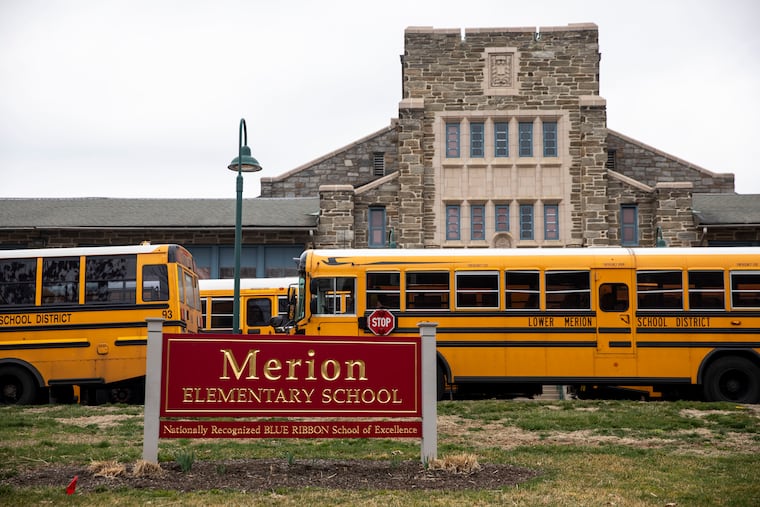Full-day kindergarten isn’t provided in some Pa. school districts. In Lower Merion, parents are trying to change that.
Of the state's 500 districts, 434 offer full-day kindergarten to all students, according to the Pennsylvania Department of Education.

Abigail Lerner Rubin has lived on her street in Bala Cynwyd for six years and hears from neighbors who have been there four times as long: They had to send their young children to private school.
The reason: The Lower Merion School District didn’t offer full-day kindergarten.
And it still doesn’t. One of Pennsylvania’s most affluent districts, Lower Merion is among a minority statewide that don’t provide full-day kindergarten to all students — though it isn’t alone in the Philadelphia suburbs.
Other area districts that don’t offer full-day kindergarten include Central Bucks, Council Rock, Garnet Valley, Haverford Township, Tredyffrin/Easttown, Unionville-Chadds Ford, and Upper Darby, among others, according to the Pennsylvania Department of Education.
Of the state’s 500 districts, 468 offer full-day kindergarten to at least some students, according to an analysis of the latest data from the department. That includes Lower Merion, which has a full-day program for eight to 12 students identified as needing additional support in three of its six elementary schools.
But among districts offering full-day kindergarten to all students, the number drops to 434, according to the department.
» READ MORE: Gov. Wolf wants full-day kindergarten in every Pa. school district. Delivering it might not be that easy.
Lower Merion parents like Rubin are pushing to change that, organizing online and calling on the district to add a universal full-day program by fall of 2023. A petition signed by more than 700 people describes the “logistics and financial burdens” of half-day kindergarten as “inequitable and unsustainable for families,” and notes that research has shown academic and developmental gains with full-day programs.
Kindergarten “is the first exposure for so many — for everybody, really — to have a standardized school experience,” said Rubin, a mother of three who is expecting her fourth. Her oldest is 5½ and enrolled in Lower Merion’s half-day kindergarten program, attending school from 12:45 to 3:25 p.m. — “a very short time to provide really any kind of instruction that can be absorbed.”
The district has pledged to evaluate what it would take to implement a full-day program — including staffing, facilities, and curriculum requirements. At a school board meeting earlier this week, administrators laid out a timeline for the analysis, beginning in September with the creation of a committee to research possibilities and the enlistment of a demographer the following month to survey preschool parents and determine how many might enroll their children.
A budget proposal would come in December, with an update presented to the school board in March 2023.
“We are seriously looking at full-day kindergarten,” said Superintendent Khalid Mumin, noting that the administration had already been planning to revisit the issue before the latest push from parents.
But, he added, there are “competing interests,” including a “healthy start times” initiative to push back high school schedules — requiring the installation of athletic field lights to allow for later sports practices — and ongoing litigation stemming from a 2016 lawsuit against the district over property tax increases. (Each year the litigation isn’t settled, Lower Merion sets another $4 million aside, Mumin said; next year’s proposed budget designates $30 million for that purpose.)
Some parents voiced frustration with the pace of the district’s plan — questioning why it couldn’t start its evaluation now — as well as one board member’s question about whether starting full-day kindergarten in fall of 2024 was too “pie-in-the-sky.”
“Dozens of people were very upset by this presentation,” one man told the board, apparently referring to comments online. “We had 40 years to prepare for this.”
One woman said her son was taking four buses a day to accommodate a wraparound program after half-day kindergarten, while another noted her daughter currently attends kindergarten in a room without a bathroom — a feature administrators had mentioned as a complicating factor when discussing what it would take to convert classrooms into kindergarten spaces. “Some of the facilities concerns you brought up don’t feel like they hold water,” she said.
Mumin said adding full-day kindergarten was “simply not prudent to do without deep assessment and planning,” while board member Peter Lee told parents it didn’t make sense to start immediately.
“I understand you feel like we could plan today,” Lee said, but “half of that would be throwaway work.” The district doesn’t know how many kindergartners will enroll this fall, he said.
While parents have issued similar calls for full-day kindergarten in the past, Rubin said this time is different: The district, which has been pressed for space, is opening a new middle school this fall.
And parents have a new outlook in light of the pandemic, Rubin said, with many typical early childhood experiences — like library story times and play dates — being put on hold the last two years.
“This lack of exposure to developmentally appropriate and necessary experiences makes full-day kindergarten even more crucial for this population of kids,” she said.
A proponent of public schools, Rubin views full-day kindergarten as a service the district should provide. “As a taxpayer and parent, I’m asking them to deliver on it,” she said.